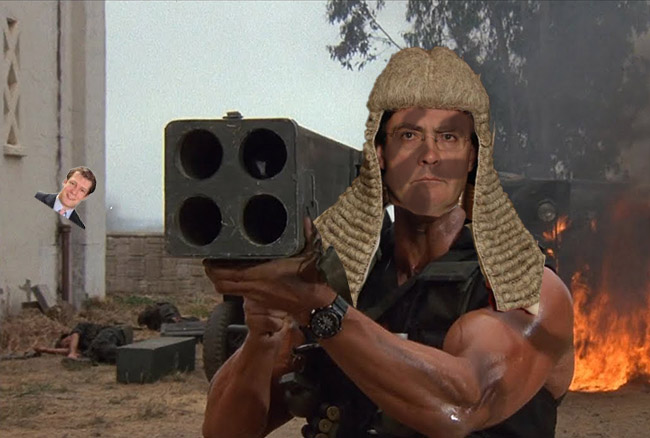
'Mislead this.'
Peter Gray, a former Gibson Dunn partner, has been struck off a mere six years after he was found to have knowingly misled a High Court judge about a grenade attack in Africa.
Gray was instructed by the government of Djibouti in its long-running feud with opposition leader Abdourahman Boreh, a wealthy businessman who had been sentenced by the Djibouti courts to 15 years in prison in 2010 for ordering a grenade strike on a Djibouti supermarket in March 2009, and who was living in exile in Belgravia.
The Djibouti government's terrorism case against Boreh hinged on phone calls which Boreh made on 5 March, the day after the grenade attack, in which Boreh was recorded saying, "Last night the act was completed in the first district", and, "The people heard it and it had a deep resonance".
Boreh insisted that he had been talking about handing out anti-government leaflets, but the incriminating date of the calls enabled Djibouti prosecutors to secure a conviction.
Gray used the same evidence to obtain a $100 million freezing order against Boreh's assets from Mr Justice Flaux, now Lord Justice Flaux, in the Commercial Court in September 2013.
There was just one problem. A month before Gray presented Flaux with the date evidence, Deborah Ngo Yogo, then a Gibson Dunn associate in Paris, had run a check on the call logs of Boreh's intercepted conversations.
Ngo Yogo noticed that the transcripts themselves were dated 4 March, not 5 March, and meant that Boreh's calls were made before the grenade attack, and couldn't possibly have captured Boreh discussing the aftermath of the strike, as it hadn't happened yet.
Ngo Yogo emailed her discovery to Sana Merchant, another Gibson Dunn associate in Gray's Djibouti team. Merchant forwarded it to Gray, writing, "Unless I am missing something, this would be a very large discrepancy". Gray replied, "It was very well spotted of you to notice the dates. Many people would not have checked and disaster would most certainly have followed".
But instead of informing the court that the basis on which the freezing order was being pursued was fatally flawed, the 39-year-old partner told his team, "we can get away with the date error". Meeting notes recorded Gray explaining that he was "going to fudge the error of the date, it doesn't affect the underlying evidence".
After the order was granted, Gray set about using Flaux's judgment in submissions to Interpol and other law enforcement agencies to get Boreh extradited, so that he might be delivered into the hands of Djibouti's security forces.
However, a year later, in September 2014, Boreh's solicitors, Byrne & Partners, uncovered the date discrepancy. They wrote to Gray asking him to confirm that the court had been misled and that Djibouti's case was unsustainable.
Gray told Khawar Qureshi QC, the barrister acting for Djibouti, that Byrne's points were "bollocks" and "a storm in a teacup", and directed him to send an evasive response.
When Mark Handley, then a senior associate in Gray's team based in London, suggested sifting through their Djibouti emails to establish how the wrong date had not been removed and when Gibson Dunn first knew about it, Gray emailed back within minutes: "This is a waste of time. Please do not do that. All you are likely to find is that on date X we realised the error, addressed it and moved on. Is that something you think it is appropriate to admit to the court? Would you like me to publicly apportion blame on other lawyers?"
In his devastating judgment in 2015 overturning the freezing order on the basis that he had been deliberately misled by Gray, Flaux said Gray's email to Handley was "disgraceful", comprising a "wholly wrong" attempt to suggest that other lawyers were also to blame.
Flaux said that Gray had been given the opportunity to accept an error had been made when Bryne & Partners wrote to him, "which is what it seems to me any honest solicitor conscious of his duties to the court would have done", but instead Gray embarked upon a "descent into what became even more evasive conduct".
Six years after Gibson Dunn was ordered to pay £800,000 towards Boreh's costs and booted the partner, Gray appeared before the Solicitors Disciplinary Tribunal where he again claimed ignorance.
Gray's counsel said that in the 2013 hearing, the partner missed the conversations between Flaux and Qureshi about the crucial date because he was emailing his Djibouti client, who wasn’t paying him $800 an hour "to sit and listen”. Gray had asked "two associates to independently check" the documents, and they had also missed the false date, he said.
Despite Gray's pleas that he was "brutally overworked" at the time, and that, despite repeated requests to Gibson Dunn, he was never given additional resources or partner support, the SDT found him guilty of dishonesty and struck him off, ordering him to pay costs of £42,525.









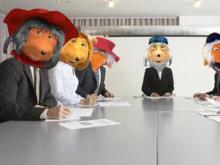

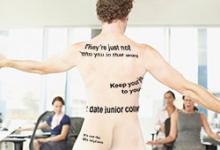
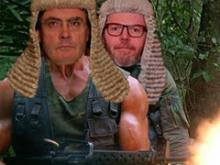
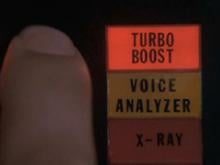
Comments
109
62
Flaux's got to be happy with that pic.
94
47
"Remember when I promised to judge you last? I lied."
90
87
Makes me cringe to read this. He just got deeper and deeper, because he couldn't bear to let down his client. Then he had to maintain the lie to protect himself, and now...ruin. Feel sorry the guy felt he couldn't come clean, TBH.
97
75
Despicable behaviour. However, I am a tad confused by the dates. The story says that 5 March was the day after the attack, but later says that 4 March was the day before the attack, which can't be correct.... I assume the story has it wrong and I have not uncovered an appeal point...
73
62
Thanks Anonymous 10:57 - amended.
81
58
Another dodgy African politician leaving in luxury in Belgravia. Quelle surprise.
97
54
"I eat naughty lawyers for breakfast. And right now, I'm very hungry!"
105
59
Sometimes it's hard not to just go with the Flaux.
87
59
Has this taken 6 years to get to striking off?
Has he been $$$ in the meantime (at another firm)?
70
73
I have read into this more. Seems like you missed a rather crucial point. He checked what he was doing with Qureshi in 2013 and in 2014. The SDT referred to an email between counsel in 2014 discussing it. So he was struck off despite checking what he was doing with leading counsel. That isn't quite the same as your breathless article implies.
98
68
Even Flaux failed to leave that litigation with clean hands. In the trial, he found against Djibouti, while exonerating Boreh. So far, so unsurprising. However, his judgment also went out of its way to exonerate DP World and so make a related arbitration against them a foregone conclusion. Between hearing the trial up to Jan 2016 and handing down judgment in March 2016, Flaux had a jolly to Dubai courtesy of the Dubai Government. You can check out his lecture to the DIFC on YouTube, with its date smack between the two - Feb 2016. One lecture in return for a winter holiday at the five star Emirates Towers. So it looks like he took a freebie from DP World's biggest shareholder and paid them back in spades. Whether that's bias I don't know, but it's hardly giving the impression of impartiality.
79
55
I've also read into it and I'm afraid it's you who has missed the crucial point, which is that it was Flaux's view that Gray kept Qureshi in the dark:
"118 (5) Contrary to Mr Gray’s purported recollection in his evidence, I do not consider that he explained the full implication of the dating error to Mr Qureshi QC either in their telephone call on 26 August 2013 or at any time thereafter. In particular, I do not consider that he ever told Mr Qureshi QC that the conviction was unsafe or that the evidence on which it had been obtained was unreliable. I consider that Mr Gray only told him that there was an error in one document referred to in the extradition request. Not only is this consistent with the contemporaneous documentation, such as Mr Gray’s own email referred to at [46] above, but as I have already held at [40] above, since Mr Simpson QC on behalf of Mr Gray expressly disavowed any allegation of professional misconduct against Mr Qureshi QC, Mr Gray simply cannot have explained the full extent of the problem to him. If Mr Qureshi QC had been aware that the conviction was unsafe and the evidence on which it was based (specifically the telephone transcripts and the confession of Mohamed Abdillahi) was unreliable because the calls had in fact taken place before the Nougaprix attack, Mr Qureshi QC simply could not and would not have made the submissions he made to the court on 10 and 11 September 2013 which I have quoted above."
Nice try though
84
63
Heh heh. Djibouti.
Gets me every time.
70
69
Qureshi sent Haywood an email in early November 2014, which says:
"Am reviewing the terrorism file again - PG repeated this morning that he mentioned the date issue before the hearing - unfortunately I cannot recall so it is possible he did tell me - I would hope I would have appreciated its potential for problems immediately…”
It's at 46.27 of the SDT judgment. That email doesn't appear in the Flaux judgment. The SDT was told this was one of a number of documents that had not been in front of him. He couldn't have reached that conclusion if he had.
So Flaux was wrong. Gray did tell Qureshi and he did understand. Haywood replied to Qureshi that - I didn’t see how [the extradition request] was relevant to a freezing injunction application.
This email exchange was before the letter was sent or the affidavit finalised. Gray's defence was that he checked all this with leading counsel, who approved. Qureshi was exonerated (as was Haywood), he was not....
The email exchange took place before the two events of 2014 (the letter and the affidavit) - ie before two of the matters he was charged with. Had Qureshi thought Gray had got it wrong in 2013, he would have advised they needed to go back to the Court, but he didn't.
85
61
Sadly for you Pete, nothing in that email renders Flaux’s conclusions void. Gray told Q, but not the full extent of it. As Flaux said: “I do not consider that he explained the full implication of the dating error to Mr Qureshi QC...I consider that Mr Gray only told him that there was an error in one document referred to in the extradition request”
71
72
Not Pete, but from his team. What's your interest? Qureshi had all the papers in front of him in both 2013 and 2014. And Flaux hadn't seen the email. He also got it wrong about what Qureshi had in front of him in 2013. Flaux can say what he likes to let off a brother barrister, but the papers show it was set out to him in very clear terms - the Byrne letters alone did that. It was an exercise in scapegoating.
77
53
FWIW I half agree with you 16:26 - I do have some qualms about how readily Q was let off the hook. But even if he did know, it doesn’t exonerate Gray, at all.
89
64
I suppose that you could say... wait for it... that the ol' judge was a bit Flaux on the uptake about what Qureshi had in front of him.
Eh, eh?
67
75
So, 16:35, if you consult leading counsel about the very thing you are accused of, that isn't exoneration? If he was in on it, I would accept that's right, but the BSB said he wasn't. And of course Haywood and all the team knew. So hardly the usual cover up.
In Brett v SRA [2014], Wilkie J held: "Every lawyer must be alive to the fact that circumstances can arise during the course of any lawyer's professional practice when matters come to his knowledge (or are obvious to him) which may have the effect of making his duty to the court his paramount duty and to act in the interests of justice. In many cases it will be clear what course the lawyer must take, either through the way in which the case is presented or by withdrawing from acting for the client. In others it may be more difficult. The lawyer may not be absolutely sure that his actions will discharge his duty to the court. In such a case, for reasons which I shall explain, a lawyer would be ill-advised if he did not put the matters before a person more senior within his firm or before independent counsel, making full and complete disclosure to such a person of all the relevant circumstances."
Gray did put it before counsel, and so would seem to have met the test. I will leave it there. It's now the weekend....
84
66
How dare you come here and quote the law.
65
63
Independent counsel - that’s the point. Not counsel on your actual matter who owes duties to the client and so can’t advise you. Simple conflict. You need to go to an independent advisor.
99
50
@1635 is correct and the references to independent counsel are irrelevant.
As the Brett case makes clear, the opinion of independent counsel is recommended in cases that are "more difficult". This is not one of those cases. Whether or not Qureshi was aware (for me, the jury's still out on that one), Gray absolutely was aware of the discrepancy and what it meant for his case. He knew what he should do and did the opposite (and then pressured others to bury the issue).
Quereshi's knowledge or acquiesence or lack thereof doesn't change that nor absolve Gray of his duty to the court.
Again, this was not a "difficult" or ambiguous situation - Gray knew exactly what he was doing and has rightly been struck off for it.
If anyone is in doubt about this, consider that, despite being fully aware that Flaux's judgment had been given on incorrect evidence and that the defendant was innocent (a least of the crime of which he was accused), Gray still tried to have the guy extradited and delivered to Djibouti's "security forces". That is bloody sinister.
89
54
So let me get this right: senior lawyers can behave badly and get 6 years before they can work in the profession whereas juniors get banned for life?
86
54
Makes sense. Juniors have so much more of their life left, so it's important to keep them out for longer.
Quick maths.